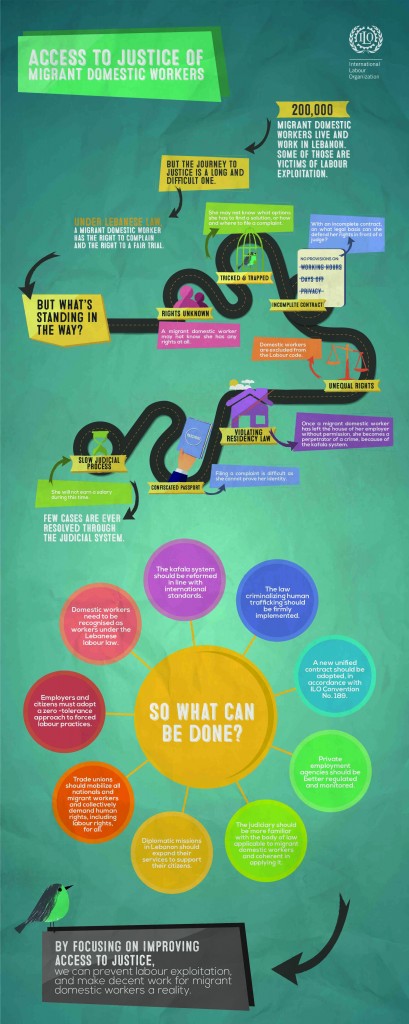Just in time for blog action day 2014 / Just in time for us to discuss frankly what we would not otherwise discuss in the official outlets of media/ Lets launch this blog!

Bait for News – The Job Swap
Tom Fletcher, the UK ambassador to Lebanon, swaps jobs with Kalkiden the “maid” of my family in Lebanon. The event was a field day for the evening news and the social media surge was the cherry-on-top-of-the-cake to the full-fledged field-work of the civil society aiming to empower migrant workers in Lebanon.
“Kalkiden are you happy?” He kept asking her.
Kalkiden was barely 18 when she signed up for the first opportunity to leave Ethiopia and start working in Lebanon as a domestic worker in order to afford the cancer that has taken her mother by surprise, herself a domestic worker in Bahrain for seven years.
Excuse the quote on quote on every other sentence >>>> I try to bring to the surface the discrimination and objectification in the Lebanese words we use to describe “our” domestic workers. And I sure hope that not only the human rights activists are reading this but also those with domestic slavery preferences as I sure don’t want to be preaching to the choir!
The story behind the story – So how did Fletcher discover Kalkiden?
Founded in 2007, the non-profit organization Catharsis became the first drama therapy center in the Middle East. Under the direction of Zeina Daccache (affectionately known as Izooo for Lebanese comedy viewers) Catharsis works on creating a medium of expression and healing for disadvantaged populations and communities in crisis, some of which include psychiatric patients, prison inmates, survivors of trauma, refugees, etc.
Catharsis, originally, is a Greek word meaning “cleansing” or “purging.” It is the purification or purgation of the emotions primarily through art. Indeed, this is the type of work I witnessed in the classes that Zeina offered the migrant workers. The students were encouraged to speak up, be proud of their origins, and often just have a laugh. I witnessed the classes because I had to. Yes unfortunately, my parents like every other employer in the Kafala System (gonna be discussed below in detail), had conditioned that I do supervise Kalkiden for the full 4 hours every Sunday because you know the saying…maids if left to wonder are going to meet a guy, run away or even worse…start to think they are like us!
Classes every Sunday totaled 4 hours: 2 hours of English and Computer with the non-governmental organization Migrant Workers Taskforce and another 2 hours with Catharsis. Those who volunteered to teach English and Computer classes are fellow friends of mine from the American University of Beirut and Sciences Po Paris. The students showed up on time, had their best clothes on, and prepared their homework before class.
As for Catharsis, I could see Zeina worked on creating a culture of your-opinion-matters as she dedicated 20 minutes for evaluation after every session. Who the hell wants to hear these guys’ opinion? If you see the conditions of these people, you would understand that valuing their opinion is already a break-through in their lives. You see Lebanon’s a democracy (a priori) but some of the voices are muffled…especially of those with darker complexion.
Classes constituted a group of around 25 migrant workers of African and Arab decent with languages ranging from Arabic, English, to French. The organizers translated accordingly often by acting the word out or dancing to its rhymes. Translation or not, Kalkiden was really shy the first few months and being the youngest among them, acquired the nickname “biberon” (baby-bottle in French).
Ok you might ask me: but employers lock-in their domestic workers, how did Kalkiden get the permission to come to Hamra to begin with? Well the real reason for taking this big step and allowing a domestic maid to leave the house is the fact that my family and I did not know how to tell Kalkiden of her mother passing away. The idea of inserting Kalkiden in a community to whom she can relate to, sounded like a healthy way to transmit the message of death with less drama to it. Indeed, Zeina and the students were super supportive. Soon enough Kalkiden found herself surrounded by those joining her in wearing black, although her mom had actually passed away 5 months earlier on.
Sometimes in Lebanon as migrant worker you lose your right for minimum wage, for legal working hours, and for keeping your passport…but the right to know whether your mom is still alive or not was just too cruel, full stop.
To build on these missing rights, Catharsis is planning a theatrical performance that the domestic workers have created and rehearsed to let the audience know of their hardships and difficulties. Previously, Catharsis has had several achievements: producing the play and the documentary “12 Angry Lebanese” presented by the inmates of Roumieh prison (2009) and the play “From the Bottom of My Brain” by psychiatric patients (2013) among other achievements.
As a new approach to advocacy and outreach, Catharsis collaborated with Her Majesty’s Ambassador to Lebanon (hereon referred to as abbreviation “HMA”) Mr. Tom Fletcher to initiate the job swap and shed the light on the likes of Kalkiden. This initiative is especially important now as it coincides with October 16 the Blog Action Day. Basically, it’s a day where bloggers from around 111 countries are filling the social media with the same theme of Human Rights…ehem 🙂 #BAD2014,#Bad14 #BlogAction14, #inequality #BlogActionDay
Domestic slavery—The work that made all work possible
With state initiatives coming to a minimum in relation to welfare services, attention is shifted to the foreign workers to fill the gap. With more demand for cheaper labor to do these caring services, domestic workers are the ones catering for middle and lower class families especially in terms of caring for the elderly and the children. Of course, these classes cannot pay high wages and rarely do reach the minimum wage whereby the vicious circle repeats itself and the domestic workers end up earning on average around $150/ month (a little less than GBP 100/month).
Home Alone: Kafala system is IN DA HOUSE!
Lebanon has a 4 million population (+1 million something refugees) and 250,000 domestic workers. The Lebanese Labor Code does not cover domestic workers whereby they are left to the maze of the Kafala system.
Under the Kafala system, as an employer I would have exceptional insane control over “my” domestic worker. Check the diagram below for a detailed explanation of this system as elucidated by the International Labor Organization (ILO).

With an unfair legal system like Kafala, a whole set of unwritten rules and norms are to follow. For instance, a “madame” (how employers usually like to be called) is often advised to threaten her maid at the first instance she detects an act of disobedience. If all else fails, the maid is sent to the agency for a few hours or even overnight where she almost always gets “tamed”…somehow. After that curious trip to the agency, the madame need not threaten the worker to send her back to Ethiopia, because it is enough to threaten the worker about sending her back to the agency, ha!
With little control over their own fates, Lebanese women employers tend to exercise patriarchal relations over the domestic workers and may resort to making statements like “I treat her like my daughter.” The idea is to co-opt the domestic workers while keeping a safe distance by forbidding the weekly day-off, friendly chat with other domestic workers, and even changing the real name of the worker to a shorter one (also a common act of colonialists). Far from what the 3rd wave feminists had in mind, the example of female employers and domestic workers in Lebanon shows how race and class divide women under the same banner (of feminism).
Changing the discourse—C189
The Human Rights Watch estimates 53 million domestic workers worldwide. Thanks to historical nuances, domestic work has always been regarded as lowly and thus was not subject to national codes during their formation. International law once again takes the center of the stage.
In the 189th Convention, the ILO produced the Convention concerning Decent Work for Domestic Workers later known as Convention on Domestic Workers (C189). This is the principal international legislation that covers labor rights for domestic workers.
Uruguay was the first country to ratify it in 2011 while Philippines ratified it in 2012, thereby making it binding by September 5, 2013. Other ratifiers include: Mauritius, Nicaragua, Italy, Bolivia, Paraguay, South Africa, Guyana, and Germany.
The most important of the rights discussed in C-189 are article 7 on paid annual leave, and daily and weekly rest periods, articles 7 and 8 on clear employment conditions before leaving their home countries, and article 4 and 11 on receiving the minimum wage.
It is important to note that neither Lebanon nor the United Kingdom are among the states that ratified, the fact that makes HMA’s initiative even more important, even more needed.
Onwards..
Some of my fellow activists are asking: so HMA was a domestic worker for a day so what?
Well, don’t worry one thing for sure, it is not her majesty bestowing on us acts of her generosity. Though this concept (“the king’s largesse”) did exist in managing civil society at some point.
It is, however, a victory to the civil society outreach that succeeded in touching upon the most influential focal points of our diplomacy, a focal point that back in the day may have preached colonialism…
At a time when a domestic worker is shunned away in the kitchen 18 hours a day, leaves the house only to walk to the garbage bin, and eats from whatever is aged 7 days (and above) in the fridge…what HMA did is a victory. A few hours of recognition to the cause, compared to a lifetime of struggle is a victory. It means the cause continues to be out there, it means the struggle is on its way.
“Yes your excellency”, Kalkiden said, “I am Very happy.”

Watch this, for a short introduction on migrant domestic workers in Lebanon by yet another component of the civil society (Kafa):
https://www.youtube.com/watch?v=6PvfXY8uNSo
More links:
http://mwtaskforce.wordpress.com/
http://www.ilo.org/dyn/normlex/en/f?p=normlexpub:12100:0::no:12100:p12100_instrument_id:2551460:no
http://www.hrw.org/news/2013/10/27/pressure-grows-protect-domestic-workers


![IMG_8198[1]](http://blogs.kent.ac.uk/klsllm/files/2014/10/IMG_81981-168x300.jpg)